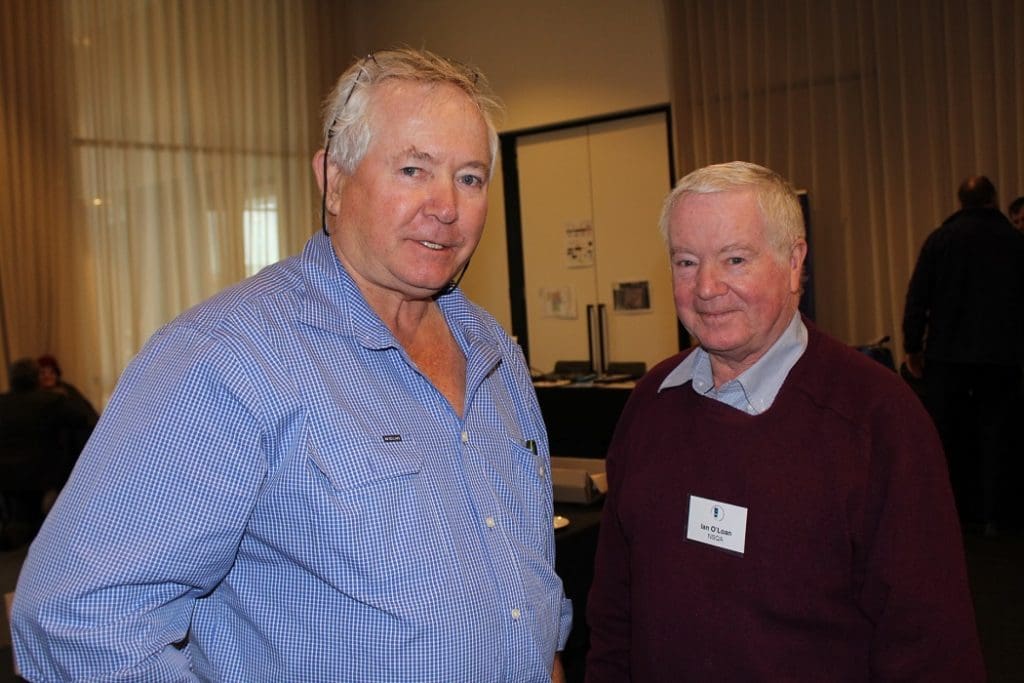
VFF Livestock Group president Leonard Vallance, left, with National Saleyard Quality Assurance program officer Ian O’Loan
NATIONALISATION of Victoria’s electronic ear tag system for sheep and goats is expected to occur through processor-imposed ‘no tag buy’ policies, saleyard managers were told last week.
And the Australian Livestock Saleyards Association conference last week was also told the South Australian-based exporter Thomas Foods International might be the first meat processor to only buy or show a preference for EID-tagged sheep, lambs and goats.
In June this year, Thomas Foods International said it would build a new advanced world-class multi-species meat processing plant at Murray Bridge with increased sheep and lamb processing capacity, after fire ravaged its flagship Murray Bridge facility in January 2018. Initial production at the new site could start as early as November 2020.
Victorian Farmers Federation Livestock Group president Leonard Vallance told the saleyards conference in Melbourne last Friday he believed TFI would source livestock for its new Murray Bridge plant with a ‘no (EID) tag no buy’ policy.
Mr Vallance’s comments were followed yesterday by the company launching its livestock certification program, the Thomas Family Guarantee, for sheep, cattle, lamb and goat production. The program requires producers to have in place a system to demonstrate complete all-of-life traceability of livestock and their movements between owners and properties.
The company’s TFG manual stipulates this may either be managed through National Livestock Identification System radio-frequency (electronic identification or EID) ear tags or through extensive livestock record keeping as part of the Livestock Production Assurance program. Records must record adequate information so that livestock can be traced back to their property of birth, the manual states.
TFI livestock assurance co-ordinator Dayna Grey said given the TFG provides greater market access and benefits to producers, the company was hoping as many suppliers as possible take part.
“This is not an onerous program and we believe every TFI producer would be well placed to meet the requirements of the TFG.”
Despite being asked specifically, TFI did not rule out adopting a ‘no-(EID) tag no-buy’ policy for sheep, lambs and goats or giving preference to buying EID-tagged animals in the future.
“We don’t anticipate this will have any immediate changes to TFI’s buying behaviour.
“Pricing will continue to reflect market conditions,” she said.
“Traceability is important in building market access and rewarding producers for high quality livestock – that’s a key reason we’ve established the TFG.
“We are supportive of producers who want to be at the forefront of technology, such as an EID system and are observing development in this area with interest,” she said.
Victoria introduced a mandatory electronic ear tag identification for sheep and goats in 2016, but no other state has followed Victoria’s lead, despite several delegations to observe the system operating and spurned invitations to join a national tag tender.
However, at the ALSA conference, Mr Vallance and saleyard managers said the state’s sheep EID system had reduced stock agent labour and clerking costs for saleyard auctions.
“To go to the other question, an abattoir got burned down here 18 months ago (Thomas Foods International at Murray Bridge, South Australia) and a new one is being built to replace it over near the (SA-Victorian) border.
“When that plant opens, I put it out there that it will be ‘no tag no buy’, Mr Vallance said.
“It will take one abattoir to say along the Victorian border somewhere to say, in future ‘this is the price if it has got a tag and this is the price if it hasn’t.
“We are an export-driven market — the rewards for having that full traceability are going to be huge,” he said.
“And these new plants, they will be rebuilt and that’s what will happen.”
EID tag system supplies automatic verification – Agriculture Victoria

Agriculture Victoria’s Ben Fahy, left, with Sheep Producers Australia policy officer Stephen Crisp at the saleyard conference.
Agriculture Victoria’s manager of livestock traceability, Ben Fahy, said for national livestock traceability to be improved, there has to be some change.
“You can either enhance the visual (tag) system or you can move to EID, which does automatic verification for you.
“In an enhanced visual system, you have to turn over a certain percentage of every single consignment coming into the saleyard, to check the tags and match the paperwork,” he said.
“In an abattoir, they are meant to check every single animal coming through that that tag in that animal matches the paperwork that they have.
“That’s the verification system for an enhanced visual mob-based movement system,” Mr Fahy said.
“Once you get EID tags in, as soon as you scan it and enter the vendor Property Identification Code (PIC), no verification required, it does it all for you.”
ALSA president Stuart McLean said he believed there was general agreement at the conference of the need for a national EID tag system for sheep and goats.
“It’s a just a matter of how it is going to be rolled out.”
Victorian Sheep and Goat Identification Advisory Committee member Gerry Leach said he suspected all the other states might “come on board” all at once.
“But we are more than likely to get the outcome faster by a domino effect, of individual states making that decision to proceed.
“I think the sector of the industry that is most likely to drive that is the processors, because just as we saw when NLIS (for cattle) was first introduced, there were exemptions to the scheme and they were to be reviewed after a period of time,” he said.
“But before that review even came up, the processors made the decision – they said ‘no, we want everybody in now.
“We haven’t got a choice – producers, saleyards, whatever – if the processors say ‘we are only going to buy your stock if they meet this requirement of ours’, then it’s hunky-dory.”
Mr Leach believed a lot of the fears among saleyards and agents about how the EID system for sheep works have now been “wiped aside.”
Mr Vallance said National Vendor Declarations were worthless until the market demanded them.
“Everybody thinks NVDs are mandatory, they are not; it’s a voluntary scheme, but you try to sell a sheep or cow in this country without one, you are not going to get paid.”

Seem to be well-covered, with commission at least doubling the last few years. Too many agents driving Saharas in the western area. Some have two.
We respect the opinions expressed in this article but the facts are that livestock agency businesses now employ extra staff to assist with the increased responsibilities put upon livestock agents in saleyards with the implementation of mandatory RFID sheep scanning.
The number of extra staff needed is dependent on their stock numbers for a particular sale and some agencies have quoted up to 20% increased labour costs.
We cannot accept the statement that ‘a lot of the fears among saleyards and agents about how the EID system for sheep works have now been wiped aside’, as some agents are reporting there are often issues which impact the amount of time agents spend on ensuring their responsibilities are met. This includes untagged animals, non-readers and sheep tags that do not match up to the PIC on the NVD.
Some of these issues can be rectified quickly and some take more time, but to say that the state’s sheep EID system had reduced stock agent labour and clerking costs for saleyard auctions is simply not true.